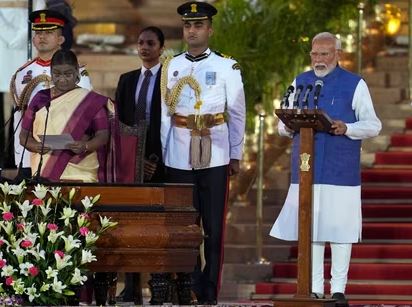Prime Minister Narendra Modi assumed charge for the third consecutive time in a row but not equalling the record of India’s first Prime Minister Jawaharlal Nehru, as many would like us to believe. Nehru’s Congress could form the government on its own in all the three terms. But, Modi’s party, the BJP, has failed to muster the magic number this time, falling short by over 30 seats. That has completely changed the scenario and mutilated bloated egos. Modi will have to reinvent himself as third-time PM since for every decision he makes he will have to depend on his two crucial allies – the Telugu Desam Party (TDP) led by N Chandrababu Naidu and Janata Dal (United) (JD-U) headed by Bihar Chief Minister Nitish Kumar, both very wily and cunning. This is something he has never experienced and so it will be a huge challenge for him. During the first two terms he had untrammelled powers to take any decision with his party having the majority. On paper it was a coalition government of the National Democratic Alliance (NDA), but in reality it was a BJP government and the allies were mere cipher. This enabled the government to implement the BJP’s main political and economic agenda driven by bias and tailor-made to benefit the super rich without any check. Now brakes will be applied as the two allies, on which the survival of the government depends, will not hopefully allow any rabid policies to be implemented.
The first signs of such resistance could be seen even before the swearing-in ceremony of the new government began 9 June. Chandrababu Naidu’s son N Lokesh Naidu said the TDP would ensure that decisions on contentious issues such as delimitation and the Uniform Civil Code are not taken unilaterally, nor would the reservation of any community be taken away.
Speaking a day before the new government was sworn-in, with TDP as the NDA’s second largest constituent with 16 MPs, Lokesh, sought to allay the fears of the minority Moslem population about their 4 per cent reservation in his state. He made it clear that TDP has always been and will remain a secular party. No one’s quota would be taken away as long as the TDP is there in the government. He even said the BJP’s stance that it would remove religion-based quota would have been valid had the party come to power on its own. The TDP, he asserted, will not withdraw the quota of any community and explained that party supremo Chandrababu Naidu has always maintained that socially and economically backward communities, irrespective of religion or caste, should get benefits in order to tackle poverty, and that will continue.
On the ticklish issue of legislative constituencies delimitation that the BJP had planned to carry out by 2026, Lokesh said that the TDP will ensure decisions are not taken unilaterally. The interests and representation of not only Andhra Pradesh but other states, too, will have to be kept in mind. The TDP’s line will be that all the NDA partners will sit together and try to arrive at a consensus.
At the moment the NDA appears to be having a smooth sailing in the formation of the government. However, the swearing-in has taken place with the air thick with suspicion and fear that either of the two crucial allies will soon pull the rug from under the BJP’s feet. This is only natural considering the history of Chandrababu Naidu and Nitish Kumar changing color whenever it suited their interests. There is not much love lost between PM Modi and the Bihar Chief Minister.
It is clear from the utterances of Opposition leaders and spokespersons of the two NDA allies that something is cooking up. The INDIA bloc has already stated it would take appropriate action at the appropriate time meaning it is only biding its time to engineer collapse of the government.
All the same the results this time around re-establish a form of balance between the government and the Opposition, harassed by government agencies hot on its trail. This is likely to put the brakes on the deterioration of democracy and the drift towards an authoritarian regime that respects neither the separation of powers nor the independence of the judiciary and checks and balances such as the Press. Along with these, Modi had also trashed federalism.
In a sense this fractured mandate means that India is entering a new period of coalition governments that many are labelling as instability. Coalitions undoubtedly will be fragile, leaving governments vulnerable but that is the best political scenario for a diverse nation like India. The tasks before the government, whichever group runs it – NDA or INDIA –, are considerable – mass unemployment, peasant distress, under-industrialization and environmental degradation. Modi said nothing about them during the campaign. The new era of coalition government may force him to concentrate more on them than on the BJP’s divisive polarisation agenda.
Good times (Achche Din) may have actually arrived.
